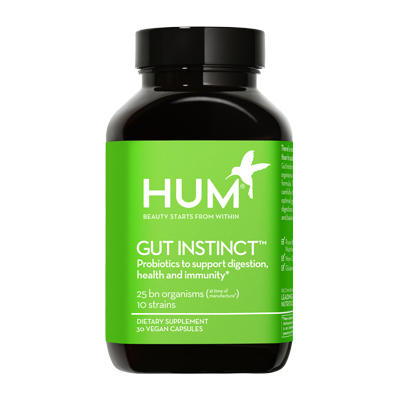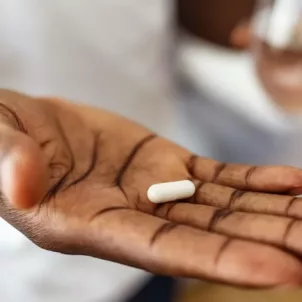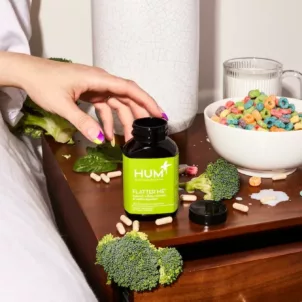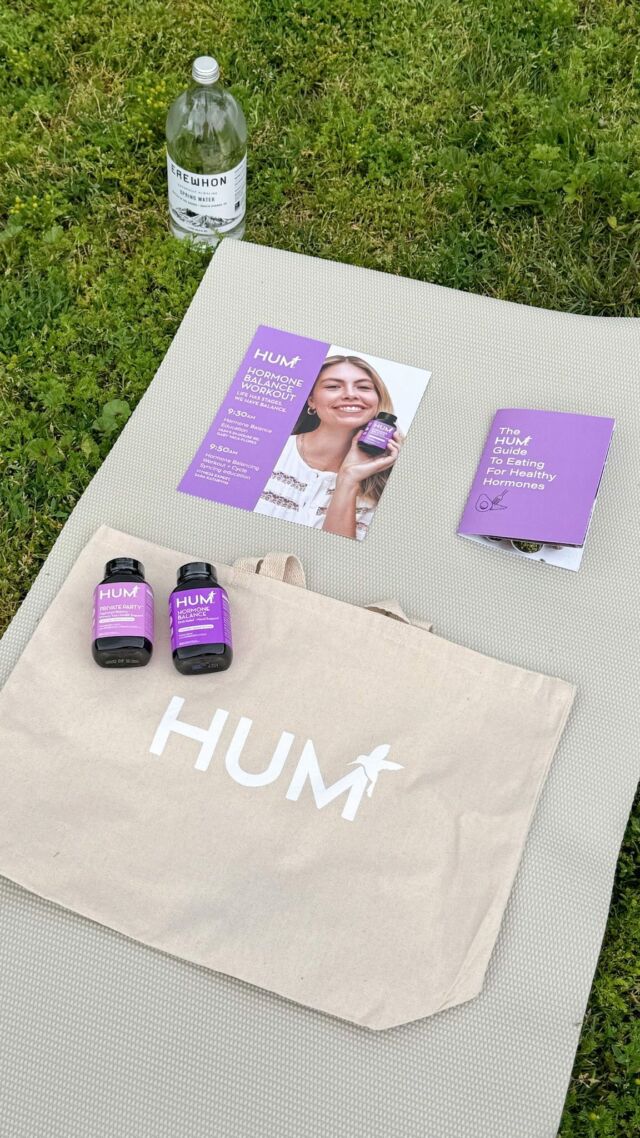Medically Reviewed By
Gaby Vaca-Flores, RDN, CLE
Registered Dietitian Nutritionist
“We are, at least from the standpoint of DNA, more microbial than human,” says Tom Insel, director of NIMH.
The gut microbiota—consisting of over two million unique bacterial genes, 1,000 different species of bacteria, and trillions of cells that together weigh anywhere from one to three pounds—refers to the microbe population living in the intestine. Growing research indicates that your gut’s microorganisms have a greater impact on your life than ever realized before. Thus, natural probiotics are instrumental in keeping your gut flora diverse and healthy.
 The bacteria in your intestines help you digest your food. They also make vitamins and molecules that are essential to your health. Furthermore, they have a wide sphere of influence including maturation, metabolism, and development. More recently, researchers have begun to look at the role gut bacteria plays in the body. They found that this sphere may be wider than ever previously thought. Here are three surprising ways your gut microbiome may be impacting you.
The bacteria in your intestines help you digest your food. They also make vitamins and molecules that are essential to your health. Furthermore, they have a wide sphere of influence including maturation, metabolism, and development. More recently, researchers have begun to look at the role gut bacteria plays in the body. They found that this sphere may be wider than ever previously thought. Here are three surprising ways your gut microbiome may be impacting you.
 Probiotics are the good guys living in your gut—live bacteria that are good for your health and digestive tract. According to Lauren Schmitt, RD and HUM nutritionist, “Probiotics help with digestion and absorption, strengthen the immune system, improve urogenital health, improve lactose intolerance symptoms, help with side effects from antibiotics, and were recently proved to lower cholesterol. By introducing these natural probiotics into the body, the body has a stronger defense against unwanted bacteria that impairs one’s health.”
Natural probiotics can be in some foods and supplements. They can be a great way to keep your gut flora diverse, happy, and healthy. This holiday season, bringing some probiotics into your routine can be a helpful way of taking care of your body.
Probiotics are the good guys living in your gut—live bacteria that are good for your health and digestive tract. According to Lauren Schmitt, RD and HUM nutritionist, “Probiotics help with digestion and absorption, strengthen the immune system, improve urogenital health, improve lactose intolerance symptoms, help with side effects from antibiotics, and were recently proved to lower cholesterol. By introducing these natural probiotics into the body, the body has a stronger defense against unwanted bacteria that impairs one’s health.”
Natural probiotics can be in some foods and supplements. They can be a great way to keep your gut flora diverse, happy, and healthy. This holiday season, bringing some probiotics into your routine can be a helpful way of taking care of your body.
3 Surprising Ways your Gut Bacteria Affects You
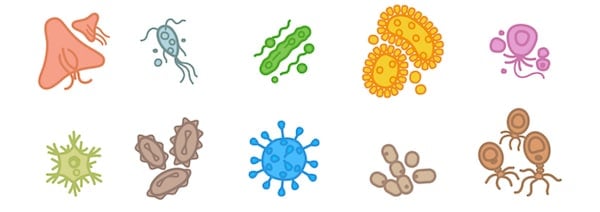 The bacteria in your intestines help you digest your food. They also make vitamins and molecules that are essential to your health. Furthermore, they have a wide sphere of influence including maturation, metabolism, and development. More recently, researchers have begun to look at the role gut bacteria plays in the body. They found that this sphere may be wider than ever previously thought. Here are three surprising ways your gut microbiome may be impacting you.
The bacteria in your intestines help you digest your food. They also make vitamins and molecules that are essential to your health. Furthermore, they have a wide sphere of influence including maturation, metabolism, and development. More recently, researchers have begun to look at the role gut bacteria plays in the body. They found that this sphere may be wider than ever previously thought. Here are three surprising ways your gut microbiome may be impacting you.
1. Immunity + Skin Health
There’s growing support for the theory that gut microbes play an essential role in the immune system. Surprisingly, the intestines contain more immune cells than the rest of the whole body. And the immune function of your gut flora isn’t just important for protecting against gut infections. Healthy gut bacteria also helps defend the body against respiratory infections. Furthermore, diseases such as cardiovascular, obesity, diabetes, and inflammatory bowel disease are associated with changes in our gut bacteria. Research is even expanding into how your gut bacteria’s influence on the immune system can in turn affect your skin’s health and appearance. W Magazine recently reported on a paper published in 2014. Researchers found an ingested form of lactobacillus paracasei improved skin sensitivity by reducing water loss from the skin’s surface, which is an important characteristic for radiant, even skin. “There’s convincing evidence now that bacteria in your gut interact with your immune system to produce changes in your skin,” the articles cites from New York dermatologist Whitney Bowe. Most recently, two teams of scientists found supporting evidence on how your gut microbes may play a role in your body’s ability to fight cancer. This study of mice concluded that the bacteria in your gut can play a significant role in your body’s natural immunity to cancer. The bacteria also impacts your response to immunotherapy drugs.2. Mood
Many of our neurochemicals—including dopamine and serotonin that communicate and regulate our moods—originate in the intestine. Some fascinating research over the past decade looks at how microbes might impact the mood. For instance, researchers in Norway studied the feces of 55 people. They found that patients diagnosed with clinical depression were more likely to have certain bacteria.3. Brain Function
Closely linked with your mood, the research on the influence of your microbiome on your brain function is similarly fascinating, particularly surrounding anxiety, communication, and memory. A researcher at McMaster University, for instance, found that strains of two bacteria (lactobacillus and bifidobacterium) reduced anxiety-like behavior in mice. An alternate study found that probiotic bacteria (the healthy bacteria that live in the gut) can help reduce signs of anxiety and boost memory. University College Cork researchers conducted a small study of healthy men and found that a daily probiotic supplement “may help people cope with mild anxiety and memory problems.” The subjects were given a capsule with a strain of live bacteria bifidobacterium longum 1714, and were found to be “less anxious and their capacity to memorize material seemed to be enhanced,” according to Ted Dinan, the leader of the study.How to keep your gut happy
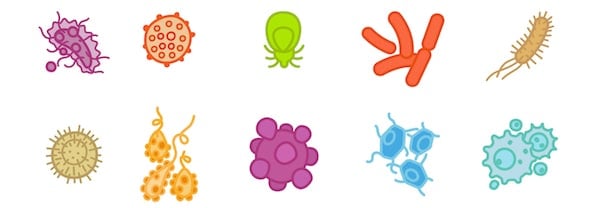 Probiotics are the good guys living in your gut—live bacteria that are good for your health and digestive tract. According to Lauren Schmitt, RD and HUM nutritionist, “Probiotics help with digestion and absorption, strengthen the immune system, improve urogenital health, improve lactose intolerance symptoms, help with side effects from antibiotics, and were recently proved to lower cholesterol. By introducing these natural probiotics into the body, the body has a stronger defense against unwanted bacteria that impairs one’s health.”
Natural probiotics can be in some foods and supplements. They can be a great way to keep your gut flora diverse, happy, and healthy. This holiday season, bringing some probiotics into your routine can be a helpful way of taking care of your body.
Probiotics are the good guys living in your gut—live bacteria that are good for your health and digestive tract. According to Lauren Schmitt, RD and HUM nutritionist, “Probiotics help with digestion and absorption, strengthen the immune system, improve urogenital health, improve lactose intolerance symptoms, help with side effects from antibiotics, and were recently proved to lower cholesterol. By introducing these natural probiotics into the body, the body has a stronger defense against unwanted bacteria that impairs one’s health.”
Natural probiotics can be in some foods and supplements. They can be a great way to keep your gut flora diverse, happy, and healthy. This holiday season, bringing some probiotics into your routine can be a helpful way of taking care of your body.
5 Ways to Add Natural Probiotics into your Holiday Meals
Lauren Schmitt, MS, RD, CPT is a registered dietitian, nutritionist, and certified personal trainer specializing in individual and corporate wellness, eating disorders, and weight management. Laurent currently owns her own business, Healthy Eating and Training (or H.E.A.T.) where she counsels individuals about nutritious eating and physical activity. Here are her tips for adding probiotics to your holiday meals: “Probiotics are live bacteria that you can ingest in supplement form or in specific foods that benefit the colon. Prebiotics are a type of dietary fiber that feed and nourish healthy bacteria that live in the colon. Fermented foods like yogurt, kefir, and sauerkraut boast the greatest amounts of natural probiotics. Prebiotics are found in plant foods such as berries, bananas, legumes, leafy greens, etc. In essence, the prebiotics will feed the bacteria in the colon, while probiotics are actual bacteria that are added to the colon. Either way, a healthy colon is the result. Here are five simple ways to make sure you’re getting natural probiotics and your gut is happy for the holidays.”1. Yogurt
Replace mayonnaise or sour cream in your holiday recipes with plain Greek or regular yogurt. You’ll not only reduce the unhealthy fats in those meals, but also give yourself a dose of probiotics. You can also make savory dips with yogurt to accompany your vegetable tray. Also, you can make a sweet yogurt dip with cinnamon for sliced apples, berries, grapes, or any fruit you desire. You can also enjoy a simple cup of yogurt for a snack.2. Fermented Fruits and Vegetables
The fermentation process enhances the amount of probiotics in your food. Try serving fermented pickles as a snack or even fermented cranberry sauce on Thanksgiving. Make sure you buy or prepare naturally fermented foods that don’t use vinegar in the process. For pickles, all you need is a solution of sea salt and water. For the cranberries, you may need to start two days before Thanksgiving to allow time for fermentation, but the wait is worth it.3. Gouda
Soft cheeses are also known for their probiotic content. We know the holidays are a time for appetizers, so choose Gouda cheese to serve with whole grain crackers and vegetables.4. Kombucha
It’s wise to start your day with kombucha, a fermented tea with a high amount of these healthy bacteria. You can purchase it in many grocery stores or you can make it yourself.5. Microalgae
It may seem frightening at first, but many people are addicted to their green smoothies. You can add microalgae such as spirulina to your smoothie to enhance its nutrient value. Enjoy a smoothie for breakfast or as a snack during the holiday season.More like this
